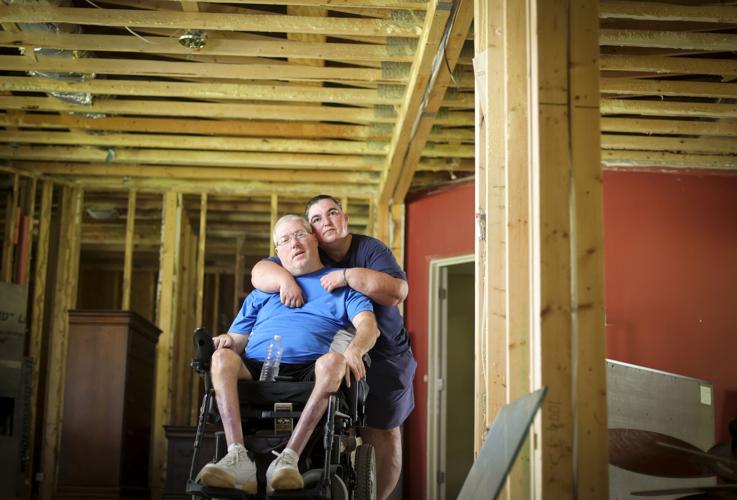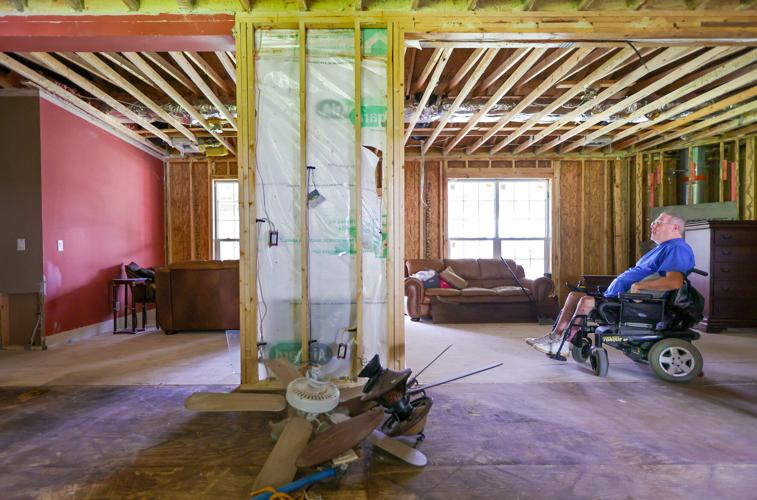Louisianans know what it looks like when a homeowner is at the mercy of their insurance company: the blue-topped roofs, the drywall mounded on the curb.
But when an insurer goes out of business, the reckoning is more likely to turn up in the mailbox, as frustrated and unpaid vendors try to collect from the last person left.
Eugene Brandt of St. Bernard Parish learned this the hard way.
Over the last two months, Brandt has watched as every benefit approved by Lighthouse Excalibur Co. turned into a liability following the company’s collapse earlier this year.
He now pays for a three-bedroom rental in Violet. The leased furniture has been repossessed. An outstanding bill for $34,000 led a mold remediation company to put a lien on his house. And another company that was hired to move, clean and store his family’s belongings are holding it all hostage until they receive a $50,000 payment.
Brandt is now caught up in the state’s cascading homeowners’ insurance crisis — a world where companies regularly fail, payments are often slow and people’s lives get put on hold while it’s all sorted out.
Seven insurers were declared insolvent in the last year, folding under financial strain in the wake of four punishing hurricanes over two years. Collectively, they left behind some 26,000 claims. Those are now in the hands of the Louisiana Insurance Guaranty Association, which inherits claims that defunct companies can’t pay.
Among the biggest failures were those of Lighthouse, which had 22,000 Louisiana customers, and Southern Fidelity Insurance Co., whose 42,000 customers in the state lost coverage this week, a month after the company was ordered into liquidation.
The broad fallout has also left the state with a hefty bill. LIGA will borrow $600 million by issuing bonds to pay off the losses from the failed companies and replenish its reserves. It’s the first time in three decades that LIGA has had to take such a step.
Consumers are struggling to make sense of it all.
“I’ve been waiting, thinking ‘oh, they’re going to find somebody to take it (the insurance claim) over,’ ” Brandt said in early June. “But in the meantime, what are we supposed to do?”
LIGA is working through a backlog of nearly 10,000 claims and expects to receive thousands more from Southern Fidelity’s recent failure. Although the association has hired at least eight adjusting firms, long waits remain a feature of the claims process.
For homeowners like Brandt, the holdup comes with a cost. He is worried the delays will keep eating into his finances, now that he’s paying rent in addition to his mortgage. And he doesn’t want to lose the house that his parents worked for years to buy.
“I can’t do that because I only owe $20,000 on it,” he said.
‘You are responsible’
Brandt and Michele Morales, his girlfriend, visited the house on a recent Tuesday in June.
Most of the flooring was gone and the walls had been stripped bare. The swelter of the Louisiana summer hung in the living room as he recounted the troubles with his insurance claim. The scene was a monument to the insurance industry’s breakdown.
Hurricane Ida was only the latest crisis. Brandt inherited the house after his father died in 2019. His mother died the year before. After their deaths, he became the legal guardian for a younger cousin who was in his parents’ care.
They were all living in the house in Violet in 2020 when Hurricane Zeta snatched off the awning that covered the large porch and carport, damaging the chimney. After some back-and-forth, the insurance company paid about $75,000 to repair it, he said. But what they didn’t know is that water was leaking through the roof. A few rings of mold surfaced on the walls and had grown larger by the time Ida came the next year. The bathroom ceiling started to sink in.
“Afterwards, you could really see spots where it was bad,” Brandt said.
An adjuster suggested two firms that Brandt had never heard of, but he trusted the advice. Everything seemed to move fast once he signed the contract with Enviro-Clean Services, a mold remediation company in Houma, and FRST Team of the Gulf Coast. They couldn’t live in the house but wanted to stay close, so they rented a place nearby.
“The insurance company was paying for everything while all of this was going on,” Brandt said.
That was in March 2022. Something strange happened in the following weeks, he said. Enviro-Clean, which planned to bill the insurer directly, called and said it was no longer being paid. Brandt got on the phone and tried to sort it out.
Days passed before he learned his insurance company was being taken over by the state. Someone else was now on the hook for paying the mold company. If there was any doubt who, the letter he received weeks later made it clear.
“Even though we sent our invoice to Lighthouse for payment as a courtesy,” reads a June 1 letter from Enviro-Clean, “you are ultimately responsible for payment of your account as agreed.”
Vendor out thousands
In times of crisis, insurance companies often turn to a cadre of vendors to aid consumers. Working directly with hotels, movers and storage companies can save them time and money.
That’s how Brandt came to rely on FRST Team of the Gulf Coast. When it became clear he and his girlfriend wouldn't be able to live in his house during the repairs, he needed to have most of their furniture and clothing moved and stored offsite.
That’s what FRST Team does. To get paid, the company must do all the work to the insurance company’s specifications, said owner Sean Chappell. That means cleaning and cataloging everything, which might explain the five-figure bill.
Because FRST Team caters to insurers, Chappell said he’s been rattled by the recent company failures in Louisiana and Florida, too. The marketplace shakeout has also forced the company into a tight spot as it waits to get paid.
“We have two or three companies right now that are insolvent,” Chappell said. “They’re not sending us a letter saying, ‘We’re going out of business.’ We’re seeing it in the newspaper or hearing it on the news or from the homeowner.”
Whether it’s a lawsuit or insolvency, homeowners often get “caught in the crossfire,” said Chappell, who has worked with insurers for 17 years.
“The only thing that we have is the items. Whatever services we provide, once we release those, we have no other ability to get paid other than to just wait,” Chappell said. “If you’ve got an insurance company that’s gone insolvent, what are we to do as a vendor?”
In the eyes of LIGA, Chappell’s FRST Team may be out of luck. A Louisiana Department of Insurance spokesperson said he may be able to recover losses through the court-appointed receiver that is now steering the failed insurers through liquidation.
While it’s not uncommon for insurance companies to make deals directly with vendors, it’s not necessarily LIGA’s job to honor those deals, said John Wells, the association’s executive director. If the contract was between the company and the homeowner, LIGA is more likely to be able to pay. That’s less often true in a business-to-business arrangement, he said.
“We’re not here to pay everybody that lost money whenever this insurance company went out of business,” Wells said. “We’re here to help the policyholders.”
Wells said a case like Brandt’s is unique, though, and the association will have to see if the service is a policyholder benefit.
“If somebody’s stuff is being held hostage, then we’re definitely going to look into that,” Wells said.
A second mortgage
In hindsight, Brandt said he would have been more cautious about the work he commissioned if he had known how everything would shake out. Paralyzed while playing high school football in 1989, Brandt has never had to worry about a homeowners’ insurance claim.
Still, he remembers thinking, as the walls were being torn out, that some of the work covered an area he thought unaffected by mold. But he stopped asking about it after the contractor said it had already been approved by the insurance company.
Looking at the final result, Brandt and Morales can’t help but wonder if Lighthouse Excalibur was asleep at the wheel, given that it was about to go under.
“From what I understood they were just going to take out the ceiling and the walls from here to there,” Brandt said, gesturing to a space in the living room. He envisioned a more targeted approach throughout the house, not a total gutting.
“It doesn’t make any sense, because now it’s going to cost us a fortune to put it back together,” Morales said.
Enviro-Clean, which provided the mold remediation services, defended the work performed and the steps the company has taken to collect the final payment, including the lien. The company said it’s easy for homeowners to misunderstand the scope of work because mold is not always visible to the eye.
Marty Boquet, president of Enviro-Clean, said a lien is a standard method of making good on a debt, recommended by the State Licensing Board for Contractors. Regardless of who ultimately pays, Boquet said homeowners like Brandt are obligated to honor the signed contract.
“Whether they want to chase their insurance down (or) deal with LIGA; whether they want to get a second mortgage on the home and determine financing,” Boquet said. “That is completely their responsibility.”
A week ago, Brandt finally received the settlement with LIGA, and it was a disappointment.
The 31 pages justifying the final payment of $81,000 said nothing about the vendor that still has all of their stuff. They estimated that the policy covered $7,755 to remediate the water and mold damage. And he received $4,340 for additional living expenses.
Brandt concluded that the remaining $69,573 was supposed to finish the job. It’s a no-win situation since he has to make up the shortfall, which will depend on the fickle labor market and inflated material costs.
“The money that’s supposed to go to the house is going to have to go to the bills,” Brandt said. “Because if I don’t pay them off, I can’t fix the house, because I’ll have a lien on it.”






